The Coroner - BBC One's hit daytime drama returns
Sally Abbott
Writer
Just over a year ago The Coroner, the first show I’ve ever created, aired. I wrote about the process of creating it for BBC Writersroom just before it transmitted. I can’t begin to tell you how completely nerve racking it was waiting to see what audiences would make of it… Or if we would even get any audiences. I was bowled over by how its audience took to it. We had fantastic reviews and averaged around 1.7 million viewers per episode with an audience share many prime time dramas would kill for.
The audience got that we had created a contemporary yet old-fashioned crime drama which was as much about life as death. At first people weren’t sure of the tone – is it meant to be funny? But then relaxed into it, enjoying its mix of warm regulars, sunny weather, stunning locations, humour, emotion and murder. They also loved its heart and I think that’s one of the most special things about The Coroner. It wears its heart unashamedly on its sleeve but without sentimentality.
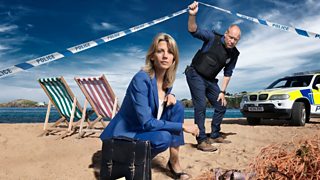
The Coroner: Jane Kennedy (Claire Goose) and DS Davey Higgins (Matt Bardock)
We found out early in the new year a second series had been greenlit and we’d been preparing for it since September, the year before. As we film in Devon, one of the UK’s busiest tourist locations, we only have a narrow filming band between April and July. But it took me AGES to develop the story for my first episode of series two (Crash, which incidentally is the last episode to be transmitted). I was writing it before the show had even aired, without knowing what the audience thought of it, without knowing if it would go again. Coming from writing continuing dramas like Casualty and EastEnders I’m a big believer that you don’t really understand what you’ve got (or if it’s even wanted) until an audience has seen it. That’s the last part of the alchemy...
But that’s also an excuse…
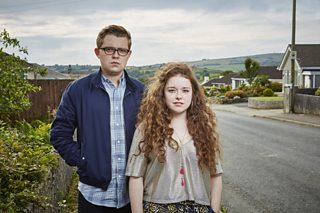
Alex (Jack Loxton), Ellie (Macy Nyman) (L-R) in The Coroner, Series 2 Episode 10 'Crash' by Sally Abbott (Photo credit: BBC/Mike Hogan)
My big problem was I was over complicating everything. I knew I wanted to have a BIG Jane and Davey bomb. I wanted us to find out why they broke up. I’d just been to my school reunion and wanted to play that into the episode too. Get a chance to see what Jane and Davey were like when they were teenagers. I created a monstrous beast where there was a death in the present which was linked with a death five years ago. But I got myself in knots, I was serving neither story. We only have 45 minutes and it’s tricky to cram in two big mystery stories and the serial element I wanted. I couldn’t get the school reunion story to work either – tonally it just wasn’t right – it didn’t feel truthful they were all partying, given the situation.
It was Ceri Meyrick (our development producer of series one and the start of series two) who suggested I drop the reunion, lose the present day death story and bring the death which happened five years ago into the present day. I needed that KISS acronym – keep it simple stupid. Those simple suggestions opened it all up. After struggling for six weeks we cracked the spine of the story in one afternoon at the BBC.
Crash shows what happens to our community when someone they all care about dies. All the characters (including Jane and Davey) knew each other as teenagers. At its heart is something quite Shakespearean and all linked to that Jane and Davey bomb. I worked with one of our fab Script Producers, Neil Irvine, to do another couple of massive drafts (I tend to rewrite everything – structure and script - at drafts two and sometimes three) and then we had it.
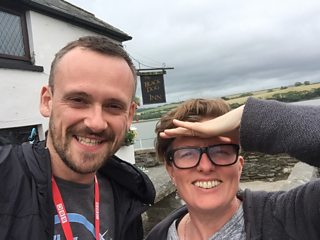
Neil Irvine (Script Producer) and Sally Abbott in front of The Coroner's Black Dog pub
I was at filming for our big Jane and Davey bomb… It was thrilling. We knew how much the audience was rooting for them both and what it would mean for them to see this moment. We didn’t know when it would go out on the series – The Coroner has an unusual format in that episodes can go in any order. We don’t have serial stories which go over several episodes. It’s so that audiences can dip in and out without missing anything. But it’s useful in the event a real life situation happens which is similar to an episode that’s about to broadcast - we can switch the order of the episodes around. Father Brown uses a similar story model. When we do have stories for our regular cast they're played out and done and dusted within a single episode.
When the crew and I watched Claire (Goose) and Matt (Bardock) filming their scene, we all turned to each other and said “That’s it, isn’t it? That’s the last scene of the series.” There was a lot of eye-dabbing going on. I’m so thrilled it’ll be the last moment we share with our audience this year.
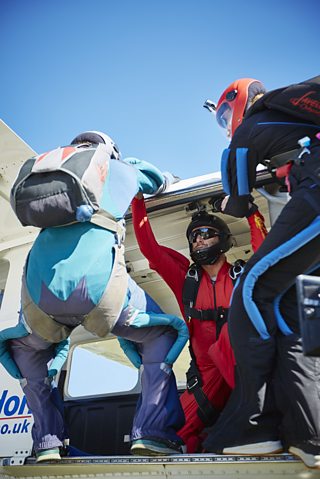
Rafe (David Corbett) in The Coroner Series 2 Episode 1 'The Drop Zone' (Photo credit: BBC/Mike Hogan)
My second episode had a much simpler process. My birthday was during the first week of transmission for series one. I don’t get to see the episodes until they’re broadcast so it was my first chance to see just how spectacularly and ambitiously filmed the whole show was. My husband had bought me the “treat” of indoor skydiving which, for some mad reason, I’d thought was going to be a really relaxing thing to do on my birthday. It wasn’t. I found it terrifying and couldn’t work out how to breathe out – the wind was blowing 140 mph against me. But I was really wowed at all the aerial tricks my instructor performed and I asked him, with my writer head on, if anyone had ever died skydiving (when I wrote Casualty I saw accidents in every situation I was in, with The Coroner it’s deaths!) He said it had happened a couple of times, I did a bit of research and got straight onto our producers to see if we could film it.
One of the huge advantages of writing Series Two is that we now know how to make it. There’s a lot of discussion about locations and stunts early on with our team to work out if episodes are feasible before any writing is ever done. Sam Hill, our series producer, thought a sky diving episode would be very doable – he even knew the airbase we could use. Through friends on Facebook, I spoke to a skydiver who gave me an overview of how it works and what can go wrong. Interestingly, I found skydiving accidents only happen due to human negligence. I didn’t want to put anyone off from doing it, so Davey’s very quick to pick Jane up whenever she mentions how dangerous it is - driving is far riskier.
At pitch stage Will Trotter, our Executive Producer, suggested an extra big twist in the story at the end to ensure we kept the audience guessing all the way through. After a lot of research and working closely with Loretta Preece (our other fab Script Producer) I wrote The Drop Zone very quickly. When I went from treatment (also known as a scene by scene document), Loretta made me promise not to do my usual trick of rewriting it all structurally as she, Will and I had thrashed out the story and we knew it worked. I didn’t need to reinvent it again. It ended up being one of the most straight forward things I’ve ever written. I felt I’d finally worked out how to write a murder mystery… I had no idea how we’d film it but our Producer, Sandra MacIver, is phenomenal – she can spin straw into gold when it comes to stretching budget. It was the last episode to be shot and when we watched the footage of the sky dive jump our jaws literally hit the floor. It looked incredible and a very VERY visual way to kick off the whole series. (Watch The Drop Zone now on BBC iPlayer)
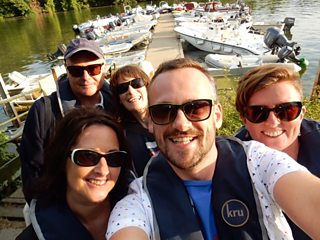
Will Trotter, Sandra MacIver, Loretta Preece, Neil Irvine and Sally Abbott on the set of The Coroner in Devon
Series Two of The Coroner is far more ambitious and bolder than series one. Kit Lambert, Matthew Cooke, Vincent Lund, David Bowker and Anne Marie di Mambro have all returned to write more episodes (Kit’s written three of this year’s series) and Jon Sen, Mark Hiser and Bridget Colgan are new writers to the show. Each episode takes us into a different world – even more wildly different than last year. They include pirates, beasts on moors, secret tunnels, life boats, dating websites (which Judith is very keen to get Jane involved with!), a prison and a haunting and beautiful episode where the bones of a new born baby are found in a derelict house by the sea.
Our production team and crew are incredible. BBC Birmingham make Doctors and Father Brown (and also WPC 56 and Land Girls) – they know how to make things quickly and on budget – which is crucial as our budgets are tiny compared to prime time, even less than last year’s, but you’d never know. We use the stunning Devon country and seaside as much as possible to create a “wow” factor. After the first series, traffic to tourism websites in South Devon went up by over 40%. There’s a huge amount of support locally for the show. It’s our love letter to Devon and I hope it shows.
In the last month Claire Goose won a Royal Television Society Award for her portrayal of Jane Kennedy, our Coroner. The show has been sold all over the world. It’s often shown in prime time overseas. It was the number one show on ABC Australia on Saturday nights recently. We have even more bold and ambitious ideas for series 3, there are still more bombs to go off with our regulars. But above all else there will be heart. Lots and lots of heart. I hope you enjoy series 2 as much as we enjoyed making it. And I really hope I’ll be writing a blog next year about the third series of The Coroner… If I haven’t just jinxed it!!
The Coroner is on BBC One Monday to Friday at 2.15pm and on BBC iPlayer for 30 days
Read scripts from The Coroner in our free online script library
